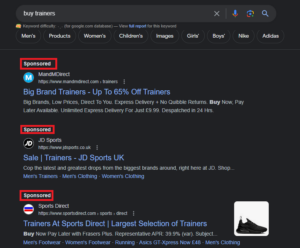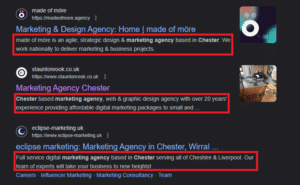When it comes to marketing your business, there’s two prevailing digital marketing strategies that always come up: search engine optimisation (SEO) or pay-per-click marketing (PPC).
Incorporating elements of both can give your business a major advantage over competitors and help you get a foothold in the digital space. But which of the two should take the lead?
PPC for SMEs: What you need to know
First, what do we mean by PPC? PPC marketing is the practice of getting your ads at the top of a search engine. Usually, that means Google – who handle up to 91.62% of all search enquiries – but it can extend to others like Bing. You’ve seen these ads before – they look like this:

Most people’s experiences with these ads are the same – you scroll right past them and toward what we call ‘organic’ search results, these without the sponsored tag. In fact, data shows that only 94% of searchers actually look at PPC ads. With that kind of retention, you’d start to worry these advertisers weren’t getting the most for their money!
But the beauty of PPC is in the name. The space on Google itself is completely free until someone clicks it. Then, you pay them what you ‘bid’ on the specific keyword that brought your ad up.
You heard me right: keywords play a massive role in PPC marketing. The marriage of the payment model and the specificity of the keyword targeting means that PPC delivers quick and easy leads. They’re cost-effective, and have a high intention to convert to paying customers.
So what can PPC do for a small business? PPC is a great driver for quick results and short-term growth. You’ll see a measurable uptick in visits to your site, along with either leads or purchases. For SSMEs, PPC is great for driving growth in a way that is targeted and suits the set budget you have for Google.
Worried about being priced out by huge national competitors? Don’t be. Google offers a suite of targeting options, allowing you to prioritise everything from advertising exclusively in your local area to specific devices and even genders.
You can see in the screenshot above – a less well known brand is managing to beat JD and Sports Direct for the coveted top of search results!
SEO for SMES: The long game
One of the most important things to bear in mind when you start with SEO is that it is a long-term strategy. Contrasted to PPC, which can deliver quick results for an ad budget, if you commit to SEO, you’re committing to a strategy that won’t see immediate returns.
But SEO can be an invaluable tool for a local business: we already know that 94% of Google searches prefer to get straight to the ‘organic’ search results rather than ads, and SEO is the art of getting your site right to the top of those.
Here’s a few good examples of organic search results:
All of these pages contain subtle optimisations – the insertion of keywords relating to our ‘Chester marketing agency’ search in their descriptions and headlines is a pattern that will exist throughout the actual content of these pages.

Google employs ‘crawlers’ who will be able to pick up on these signifiers and begin to assign relevance to the page. Over a process of weeks or even months, the rankings of pages on Google can fluctuate: getting to the top of organic results is a constant battle.
The primary benefit of SEO is that there is no cost – beyond the hosting of your site – for trying it. The returns, however, are less immediate and difficult to guarantee: getting the golden ticket of top-ranking pages is almost guaranteed to generate great results for your site, but pursuing it can lead you down a rabbit hole.
PPC vs SEO: Which works best for you?
Ultimately, both strategies are very different in their impacts and outcomes. PPC can tend to be more expensive, but results are certain: SEO is less taxing, but it represents a long term commitment your business may be uncomfortable taking.
You should consider these upsides and downsides carefully as you take your first steps into the world of digital marketing. As part of a balanced strategy, both will eventually enter into the equation: but knowing which to prioritise will give you an edge for long-term success.
It can be difficult to make these calls yourself, especially without expert advice. A PPC agency in Chester might be able to help you by taking on the technical side and formulating a targeted marketing strategy that works for your business.




